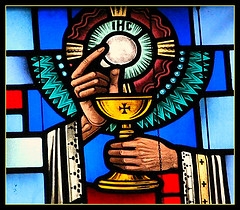Holy Communion

Holy Communion is at the heart and centre of Lutheran worship. If you would like to know more about the Lutheran teaching and practice of Holy Communion the following is from an official LCA document called 'Some pastoral guidelines for responsible communion practice'
Scripture and Luther’s Small Catechism teach that holy communion is ‘the true body and
blood of our Lord Jesus Christ given with bread and wine, instituted by Christ himself for
us to eat and drink’. The benefits of such eating and drinking are ‘the forgiveness of sins, life, and salvation’.
Every communicant, even an impenitent and unbelieving one, receives Christ’s body and blood in this sacrament. But the benefits of the sacrament - forgiveness, life, and salvation — are received only by penitent believers who accept Christ’s words and trust his promises expressed in the words of institution.
So the Lord’s supper is a means of grace. It nourishes and strengthens God’s people. The body and blood of Christ, given in and with the bread and wine, make the Lord’s supper a precious gift, which believers receive joyfully and thankfully.
Such a precious gift should not be regarded lightly. The Apostle Paul warns against the sin of eating and drinking ‘in an unworthy manner’ (1 Corinthians 11:27-29). Those who administer the Lord’s supper and those who receive it both have the responsibility of doing so only and always in a way which is in keeping with the nature of the sacrament.
Therefore responsible celebration of the Lord’s supper requires that we try to ensure that all who commune
a) are baptised and believe in the Triune God;
b) confess Christ as their only Saviour;
c) repent of sin and seek to live in accordance with their confession of faith in Christ;
d) confess the real presence in the sacrament of Christ’s body and blood, given and shed for the forgiveness of sins (1 Corinthians 10:16,17; 11:17-28).
If this raises issues and concerns for you please feel free to contact St Paul's pastor on 32661222. God bless you.